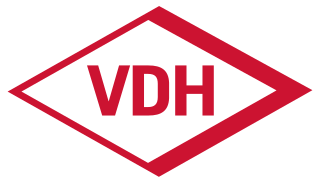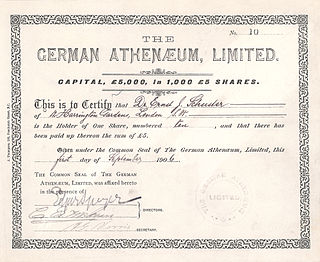Verein Deutscher Ingenieure (VDI) is an organization with over 150,000 engineers and natural scientists. More than 12,000 honorary experts process the latest findings every year to promote the technology location. Established in 1856, the VDI is today the largest engineering association in Western Europe. The role of the VDI in Germany is comparable to that of the American Society of Civil Engineers (ASCE) in the United States or Engineers Australia (EA) in Australia barring the broader field of work of the VDI. The VDI is not a union. The association promotes the advancement of technology and represents the interests of engineers and of engineering businesses in Germany.
Public water supply and sanitation in Germany is universal and of good quality. Some salient features of the sector compared to other developed countries are its very low per capita water use, the high share of advanced wastewater treatment and very low distribution losses. Responsibility for water supply and sanitation provision lies with municipalities, which are regulated by the states. Professional associations and utility associations play an important role in the sector. As in other EU countries, most of the standards applicable to the sector are set in Brussels. Recent developments include a trend to create commercial public utilities under private law and an effort to modernize the sector, including through more systematic benchmarking.
The purpose of the Kirchweger condenser was to preheat feedwater in a steam locomotive using the exhaust steam from the engine. It was invented in 1850 by Heinrich Kirchweger. A similar system was developed by Rohrbeck.
Vereinigung may refer to:

The German Alpine Club is the world's largest climbing association, and the eighth-largest sports union in Germany. The Club is a member of the German Olympic Sports Confederation, and the responsible body for sport and competition climbing, hiking, mountaineering, hill walking, ice climbing, mountain expeditions, as well as ski mountaineering.

DEKRA is a European vehicle inspection company founded in Berlin, Germany in 1925 as Deutscher Kraftfahrzeug-Überwachungs-Verein. With approximately 45,000 employees and revenues of roughly €3.3 billion, DEKRA is the largest inspection company in Germany and the third-largest in the world. By its own account, it is the European market leader. The group focuses on the inspection of vehicles and technical systems, but also offers other services. DEKRA has had its headquarters in Stuttgart since 1946. Business operations are carried out by DEKRA SE, which is wholly owned by DEKRA e. V.

Gustav Heinrich Johann Apollon Tammann was a prominent Baltic German chemist-physicist who made important contributions in the fields of glassy and solid solutions, heterogeneous equilibria, crystallization, and metallurgy.

Verband für das Deutsche Hundewesen (VDH) is Germany's Kennel club for dogs and represents Germany in the world federation Fédération Cynologique Internationale. It is headquartered in Dortmund, Germany.

Karl Imhoff was a German civil engineer, author, and a pioneer of wastewater treatment used throughout the world.

The Mechanical Engineering Industry Association has its headquarters in Frankfurt am Main, Germany, and represents around 3,200 members, making it the largest industry association in Europe. The Association represents the interests of the predominantly medium-sized companies in the mechanical engineering industry towards policymakers and society, as well as towards business, the scientific community, public authorities and the media. With more than 1.3 million employees and a turnover of around EUR 228,7 billion (2019) mechanical and plant engineering is Germany's largest employer in the industrial sector. German machinery production is valued at EUR 224 billion (2019) and Germany's mechanical and plant engineering sector is extremely export-oriented . In addition, VDMA sees itself as a platform that provides its member companies with various networks where they can discuss technological challenges, interdisciplinary issues and many other topics. The association was founded in 1892.
The Steel Institute VDEh is a techno-economic organisation of the German steel industry headquartered in Düsseldorf, Germany. The institute was founded in 1860 as "Technical association for steelmaking". Between 1880 and 2002, the association was called "Association of German steel manufacturers" or VDEh for short. In 2003, the name was changed to its present form "Steel institute VDEh", while retaining the old abbreviation VDEh as part of the name.

Henriette Goldschmidt (1825–1920) was a German Jewish feminist, pedagogist and social worker. She was one of the founders of the German Women's Association and worked to improve women's rights to access education and employment. As part of that effort, she founded the Society for Family Education and for People's Welfare and the first school offering higher education to women in Germany.
Alfred Herrmann was a German historian, journalist and politician.
ProVeg Deutschland e. V. is a German non-profit organisation whose goal is to reduce the consumption of animal products. ProVeg Deutschland is part of ProVeg International, which serves as an international umbrella for a group of nationally operating organisations.
The Deutscher Musikrat is an umbrella organization for music associations and the 16 music councils of the German federal states. It represents over 14 million music-loving citizens who, for professional reasons or as amateurs, are affiliated with the Musikrat and its member organizations. With more than 100 member associations, institutions and numerous personalities, it acts, together with its projects and support measures, as an advisor and competence centre for politics and civil society.

Niederaichbach Nuclear Power Plant was a German nuclear plant in Niederaichbach, Bavaria. The plant consisted of one heavy water gas cooled (HWGC) reactor with a gross capacity of 106 MWe. Safety and maintenance issues caused the reactor to be decommissioned after only a year and a half in operation. It was the first nuclear plant in Europe to be completely decommissioned, with the final work being completed in autumn 1995.
The Bundesverband der Deutschen Luft- und Raumfahrtindustrie (BDLI) is a German association of companies and institutions in the aerospace industry with its headquarters in Berlin, Germany.

The German Athenaeum was founded in 1869 by German artists and writers, with Gottfried Kinkel playing a key role. It was an elitist association of Germans in London who belonged to the middle to upper social class. This is reflected in the membership fees, which were quite high for the time: After a one-off membership payment of initially 15 guineas, scientists, artists and authors paid 4 guineas per year, while all other members paid 6 guineas per year. Membership was later acquired through the purchase of a share certificate, 1,000 of which were issued with a face value of £5 each.
Helga Weippert was a German scholar of the Old Testament.








